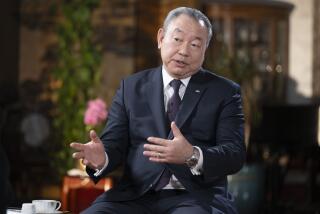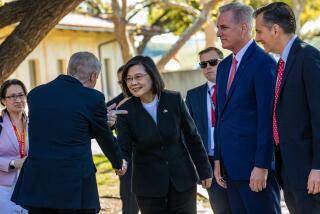U.S. Hoping for Peaceful Resolution of China Protests, Quayle Tells Beijing Official
WASHINGTON — In the highest level U.S.-Chinese contact since massive pro-democracy demonstrations began in China, Vice President Dan Quayle on Monday told Chinese official Wan Li that he hopes the confrontation between protesters and the government “will be successfully concluded without any violence.”
Wan, chairman of the Standing Committee of China’s National People’s Congress, was given a private message by Quayle--as well as a public warning during a photo session--that the United States is keeping careful track of the demonstrations and the progress of rights and democracy in China.
Avoid Violence
An Administration official, speaking on condition of anonymity, said that--although Quayle spoke about the need to avoid violence without mentioning either side--the message was clearly directed at the government.
“We support the advancement of democracy, freedom and human rights around the world,” Quayle said. “We certainly hope that the public demonstrations that have gone on in China and that continue will be successfully concluded without any violence.”
Meanwhile, the Voice of America reported that its broadcasts to China are being jammed by Chinese authorities on several frequencies--a step that would deprive Chinese listeners of one of their main sources of Western news coverage of the turmoil.
VOA Jamming
It was the first jamming by the Chinese of Voice of America transmissions since some time before the United States and China restored diplomatic relations in 1979. Deputy White House Press Secretary Roman Popadiuk said: “We are disturbed with any interference with news media or communication.”
Wan is in Washington to acquaint Administration officials with the results of the recently concluded Sino-Soviet summit. In addition, Foreign Minister Qian Qichen is also being dispatched to Washington, to assure the United States that in the wake of the summit, Beijing has not tilted toward the Soviet Union. The Wan visit was scheduled well before the student uprising began.
In recent days, the White House has taken pains to maintain its cautious approach to the Chinese turmoil for fear of damaging bilateral relations--a stance so far supported at least by some in Congress, although there has been some criticism. But, rather than appear too chummy with the Chinese official, officials canceled plans for Wan to play tennis with President Bush today.
Inappropriate Time
“I guess it was felt that, given the current situation, the need maybe to discuss the situation in China, it would be inappropriate at this time,” Popadiuk said.
Bush has made clear his preference for a peaceful resolution to the turmoil in China and has cautioned both sides to avoid violence.
“We do support freedom of speech, freedom of assembly, freedom of the press, and clearly, we support democracy,” he told a news conference in Boston on Sunday. “I don’t want to be gratuitous in giving advice, but I would encourage restraint.”
Saying that he does not want to see bloodshed, Bush reminded the Chinese of the respect in the United States for the nonviolent efforts of the late Dr. Martin Luther King Jr. and added: “I might suggest a familiarization with that for the people in China.”
Not ‘Too Involved’
The President’s approach was supported by Sen. Alan Cranston (D-Calif.), who said that “it doesn’t help to get too involved” in the unrest in China, while also supporting the efforts by the United States to express support for political freedom there.
He added: “I think we should encourage them (the Chinese leaders) to be more forthcoming.”
He said that given the situation, “It’s not wise to do anything provocative” and that a statement any more encouraging to the demonstrators on the part of the Bush Administration would be seen by the Chinese government as provocative.
However, Rep. Robert G. Toricelli (D-N.J.), a member of the House Foreign Affairs subcommittee on East Asia and the Pacific, was sharply critical.
He said that the Bush Administration has lost an opportunity to ally itself with the forces for greater human rights and change in China and that it is taking too much care to avoid antagonizing the aging Chinese leadership, particularly Deng Xiaoping.
Not Same Scale
“President Bush is balancing the chances of offending an 84-year-old Communist leader during his last days in power with speaking to the aspiration of one billion Chinese people,” Toricelli said. “I don’t think the two should be weighed on the same scale.”
Toricelli said that Bush’s approach would be “remembered by a new generation of Chinese for a long time.” He added: “A democratic revolution is taking place and the world’s leading democracy will be remembered as being silent and the Soviet Union will be remembered as the source of change.”
Meanwhile, one Administration official, speaking on condition of anonymity, said that during the meeting between Wan and Quayle, the Chinese official appeared to be “positioning himself on everybody’s side.”
Wan told Quayle, the official said, that “reasonable demands will eventually be granted but we can’t make any progress as long as there is any disruption and civil unrest.”
The official added that the Chinese leader reported there would be “no bloodshed” on the part of Chinese army units called in to put down the unrest if the students act in a restrained manner.
More to Read
Sign up for Essential California
The most important California stories and recommendations in your inbox every morning.
You may occasionally receive promotional content from the Los Angeles Times.










